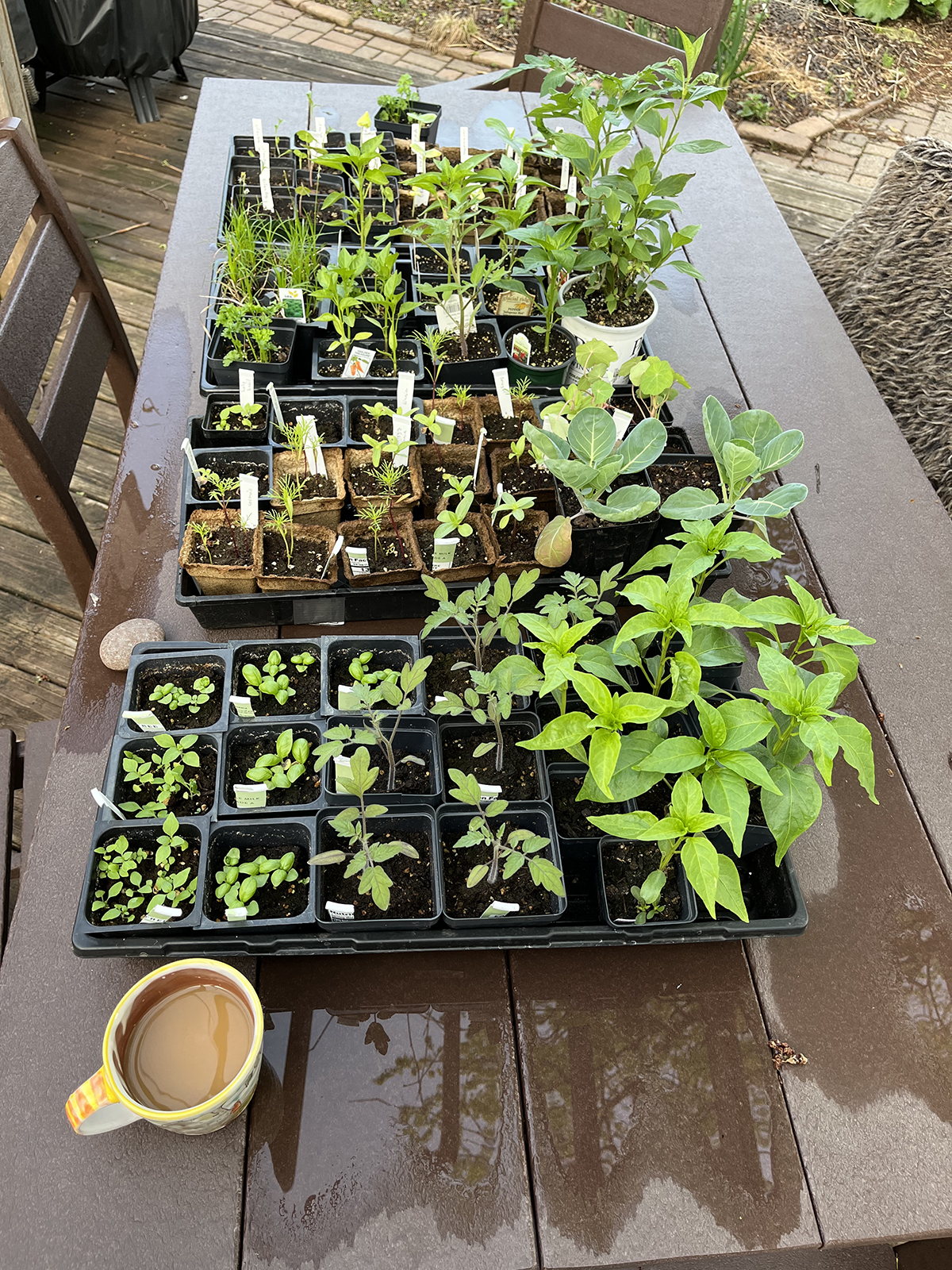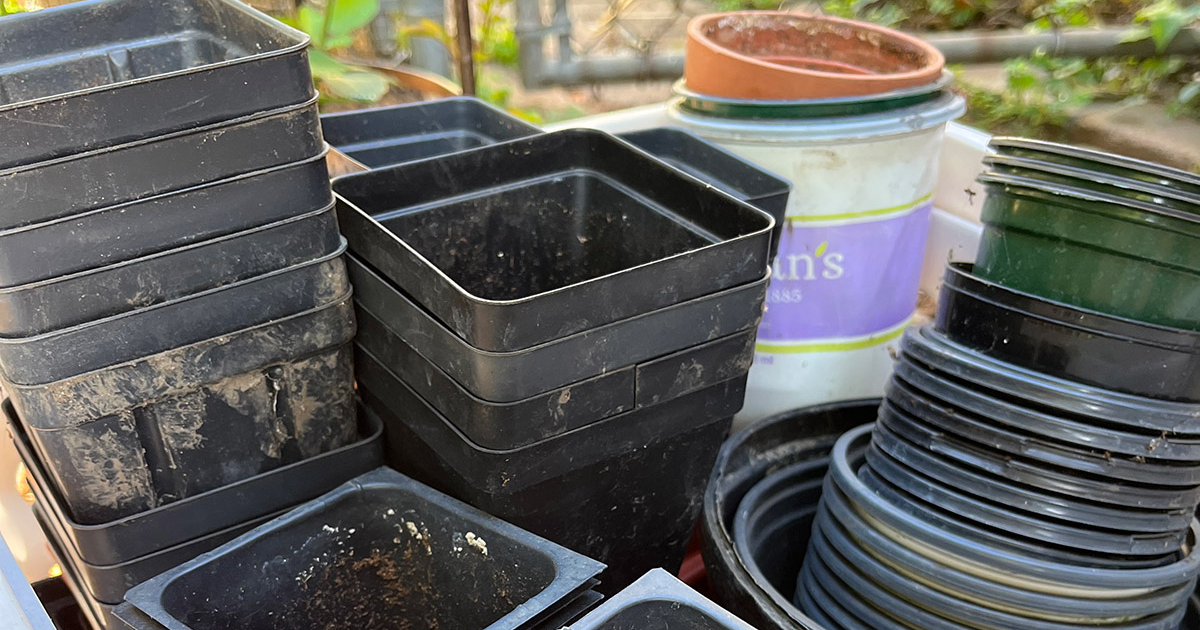Ask a Master Gardener: Where Can I Recycle Plastic Plant Pots?
Greetings, fellow gardeners of the north. As a Hennepin County Master Gardener, I’m used to fielding questions about gardening. From “does my ash tree have emerald ash borer?” to “why do I never get any tomatoes?”
I’ve been contributing columns, feature articles and photographs to Northern Gardener magazine for about three years now, and jumped at the chance to contribute to this new feature on the blog.
Have a gardening question? Send it to info@northerngardener.org. Each month, I’ll choose a question to answer right here. If I don’t get to your question, come visit a Master Gardener booth at a local farmer’s market or call the Yard & Garden line at (612) 301-7590. We live for this stuff.
Other helpful resources:
The Master Gardener Volunteer program
Without further ado, here’s our kick-off question for July.

Q: Where can I take my black plastic pots and trays to be recycled?
A: This time of year, I always find myself with a large box of leftover plastic plant pots and trays. What to do with them?
Unfortunately, they can’t be recycled through most cities’ curbside recycling programs, since black plastic is not accepted. The reason? Machines at facilities that accept unsorted recyclables use optical scanning to “look” for plastics, which they fish out of the stream of recyclable materials. As cool as these machines are, they are not (yet) sophisticated enough to “see” black plastic. Therefore, most cities do not accept black plastic for recycling.
So what’s an earth-minded gardener to do?
First, ask yourself whether you can repurpose any of the pots for your own use. If you do any seed starting, sturdier pots can be used several times before their lifespan is up. I’ve been using the same black plastic pots to start seeds for several years now. Just be sure you clean them thoroughly with hot, soapy water with a bit of bleach added to it to kill any pathogens that might be clinging to them.
Once you’ve set aside the ones you can reuse, it’s time to figure out where you can take the rest for recycling.
Home Depot accepts all plastic pots-I called my area’s Home Depot in Richfield to confirm. Lowe’s accepts plastic pots AND trays. The friendly folks at the Lowe’s in Plymouth confirmed. It doesn’t hurt to call first, just to make sure.
Finally, you can also take steps to avoid this problem in the first place by seeking out plants that are started in compostable containers, or save money and avoid black plastic by starting more of your perennials the easy way with winter sowing.
Jennifer Rensenbrink is a University of MN Extension Master Gardener for Hennepin County. She grows native plants, vegetables and fruit in her south Minneapolis yard. You can follow her gardening adventures on Instagram.
To learn more, join a webinar or workshop…
UPCOMING CLASSES

Good to know about why the black plant pots can’t be recycled. I’ve read the Proven Winners brand white pots are acceptable in the curbside recycling. Is this accurate information?
Good question. We recommend looking at the bottom of a pot to see the plastic number on it. Minneapolis, for example, does not accept #3, #4, #6 and #7 plastics, in addition to black plastics. (It’s a bummer.) We just looked at some Proven Winners pots and they are labeled as #5 plastic on the bottom, so they *should* be recyclable, according to this city of Minneapolis webpage (https://www.minneapolismn.gov/resident-services/garbage-recycling-cleanup/recycling/accepted-recycling/). Also, under “why choose us”, the Proven Winners webpage claims their pots are recyclable. You may want to call your local facility, describe the pot to them and then (pretty please) get back to us with the answer. Like you, we have a handful of those Proven Winners pots as well!
Thank you for writing specifically about the black plastic issue with single sort recycling. I don’t think that is widely known. Another option that has worked for me is posting them for free online. I’m usually able to find someone that needs them, especially if I’m willing to deliver!
Excellent, so glad this was helpful. Great idea to post online – so many Facebook and Buy Nothing groups to share with now. Thanks, Monica!
When I called Home Depot they said no, not a program at their company. I’ve been bringing them to Lowe’s for years.
Thanks for the scoop, Teresa. What county are you in?
Wonderful information. Thank you!
Glad it was useful, Carmelita!
I would like to add to check with the local garden center you purchased from as they may reuse a great portion of those containers and trays or perhaps their employees will reuse or they can get them in the hands of local gardening clubs!
Great tips – thanks for adding!
Is white garden phlox considered a native plant?
Hi, Cass. Wild blue phlox is native to Minnesota, but white garden phlox is not.
Do you know what happens to them after you give them to Lowes or Home Depot?
Oh boy, we didn’t go that far in our research, so note sure what happens after you give your pots to Lowes or Home Depot. Here’s what Home Depot’s corporate website says: https://corporate.homedepot.com/news/sustainability/plant-it-again-plant-pot-recycling-program
Lowes doesn’t have a fun infographic, but they did share this blog post:
https://corporate.lowes.com/newsroom/stories/fresh-thinking/are-you-wishcycler#:~:text=Lowe's%20offers%20in%2Dstore%20recycling,the%20company%20will%20recycle%20them!
At Lowe’s, they sit on the cart where you drop them off for others to grab as needed. The last time I made a drop in the fall, there was a couple there grabbing items and they were very happy to take some of my stuff, especially the hanging baskets. So really it’s not a recycling drop-off but a reuse drop-off.
Hello,
Each year I drag my Bougainvillea in to the house and back out in late spring.
I have never been able to get it to bloom –
below some of the advice from gardeners I have tried-
a. More fertilizer.
b. Holding off water (Some advise to treat like a weed).
c. Pruning it.
Any advice would be appreciated.
Thank you
It’s not bougainvillea’s natural state to go into dormancy, but it can be done (one of our team member’s in-laws do it).
1. Put it in a cool dark place during winter. Water it -just- enough, so the root ball doesn’t dry out (maybe once a month).
2. Bring it to a warm place indoors in spring (March is a good time). Start watering and fertilizing lightly.
3. Bougainvillea blooms on new wood, so cut the plant back about a third to stimulate new growth.
4. Bring it outside when there’s no more chance of frost. Water/fertilize according to growth.
Good luck!
It should be clarified that some black plastic has a number on it. In my county, I can recycle any color of plastic with a 1, 2, 4, or 5 on it including the black ones. I checked with our environmental person in the county and he said he had never heard of the machine not being able to “see” black but said that’s very possible with some recycling programs. In our county, it is hand sorted. Of course this is not the case in the metro, but may be so in rural counties. I’d suggest checking with local garbage haulers and county environmental programs (wherever you are) to see what they accept. It is different from place to place. Also interesting, our local nursery checked with the county on what to do with all of the leftover unnumbered black plastic they had. The county took all that which is encouraging. They do have a place they can take it to. Please remember there are many hort society members outside the metro area. This is a complex issue – so again, check locally.
All good points – thanks for chiming in, Colleen.
How do I reach out to a Master Gardner to discuss a larger project (getting rid of front yard and replacing it with a pollinators paradise)?
Hi Kymberly. Master Gardeners don’t generally do one-on-one education, with a couple exceptions, including the Lawns to Legumes program—they provide personalized coaching from native plant enthusiasts (some of whom, like me, are Master Gardeners). You can even apply for a grant to help purchase the new plants for your front yard. Here is some information on the program:
https://bwsr.state.mn.us/l2l